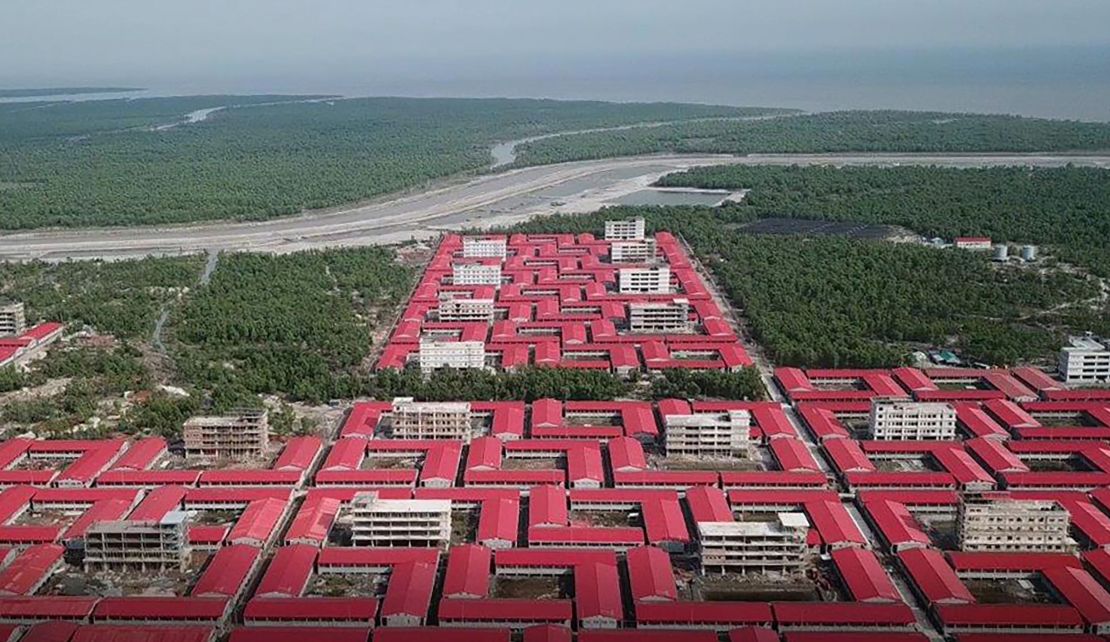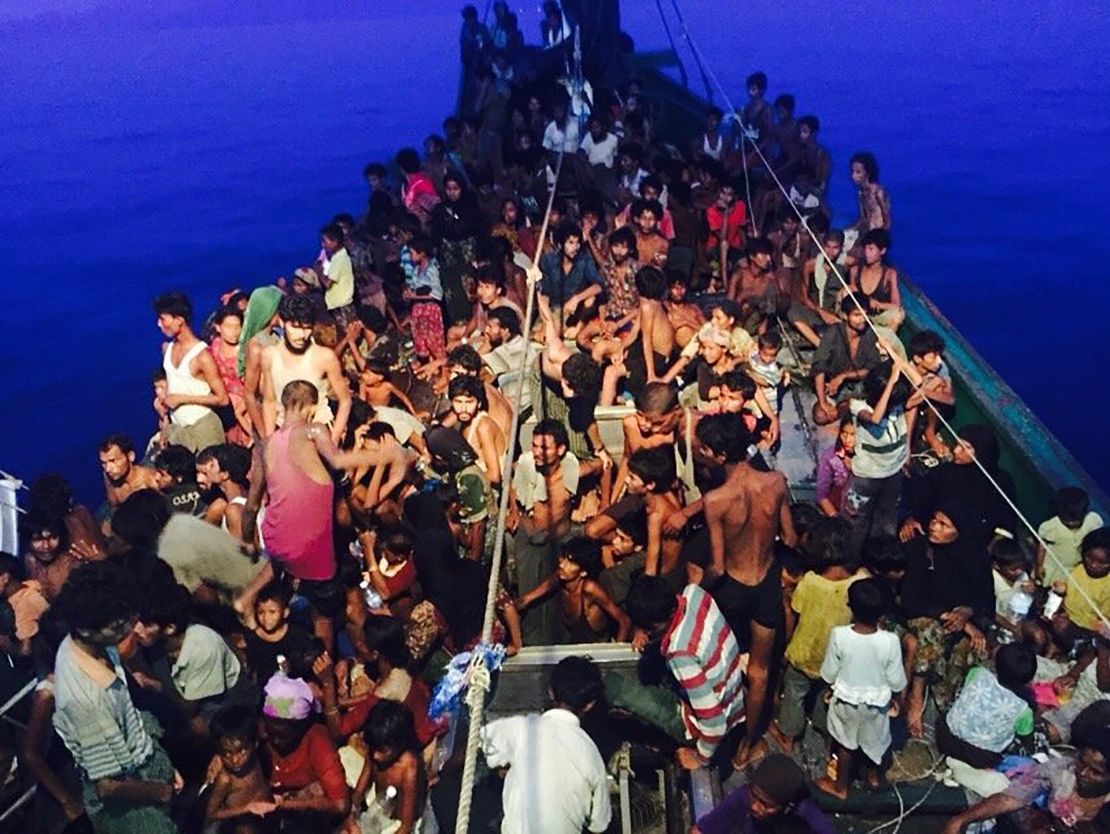Dozens of Rohingya refugees stranded at sea for weeks are being quarantined for coronavirus on a remote island in the Bay of Bengal after docking in Bangladesh on Saturday.
The 29 refugees, mostly women and children, were taken to the cyclone-prone island Bhashan Char – also known as Thengar Char – in order to protect the sprawling refugee camps of Cox’s Bazar from the spread of Covid-19, Bangladesh Naval Lieutenant Abdur Rashid told CNN.
Cox’s Bazar, home to nearly one million Rohingya refugees, has been in strict lockdown since early April – only very limited movement is allowed within the squalid cluster of makeshift camps.
The refugees now on Bhashan Char were among hundreds of Rohingya Muslim refugees trapped at sea for weeks in “appalling conditions” after trying to flee to Malaysia, according to a statement from the European Union. The stateless ethnic minority are not recognized as citizens by their home country of Myanmar, despite tracing their roots there for centuries. Bangladesh has taken in hundreds of thousands of refugees who fled on humanitarian grounds, but they are not afforded any rights there and are confined to refugee camps. Authorities are still investigating where the group sailed from.
Rashid says the group – which includes 19 women, five men and five children – are not believed to be ill with the virus that has killed almost 250,000 people worldwide.
“They do not have corona symptoms, but the investigation and medical tests are underway,” Rashid said.
Bangladesh Refugee Relief and Repatriation Commissioner Mahbub Alam Talukder confirmed that 29 people were “sent to Bhashan Char by the Bangladesh military” where they have access to medical facilities, food and water. It is not clear if they will be returned to the mainland after a quarantine period, or if they will remain there, Talukder added.

They are the first Rohingya refugees to be sent to the island. The government has been building facilities there for several years, with the plan to relocate thousands of people from Cox’s Bazar, though no timetable has been set.
Many of them fled from Myanmar to Bangladesh to escape a violent military crackdown in 2017, which led the International Court of Justice in The Hague to order Myanmar to protect the Rohingya population from acts of genocide.
The Myanmar government has denied committing genocide, but has admitted that some soldiers carried out war crimes. Multiple attempts at repatriating the refugees to Myanmar have failed, partly due to fears among the Rohingya population that they’ll be targeted again. The United Nations is also concerned about its lack of access to the areas of return.
CNN was unable to reach the Bangladesh Foreign Ministry for comment.
Uninhabited low-lying island
Moving the Rohingya refugees to Bhashan Char is also problematic. The UN says more time is needed to assess the safety of the uninhabited low-lying island, as it often becomes partially submerged during monsoon season, which is rapidly approaching.
On Monday, Myanmar’s state-run newspaper the Global New Light of Myanmar warned that an area of low pressure in the Bay of Bengal and Andaman Sea is forecast to intensify into a depression over the next few days, bringing heavy rain.
“The UN’s longstanding position is that comprehensive technical and protection assessments to evaluate the safety and sustainability of life on Bhasan Char are essential before any relocations to the island take place,” said Louise Donovan, from the UN Refugee Agency (UNHCR) in Cox’s Bazar. “The UN has long been prepared to proceed with onsite assessment work.”
As of Friday, as many as 800 Rohingya refugees were believed to be stranded on boats in the Bay of Bengal, according to Amnesty International.
The group issued an open letter urging governments in the region to allow them to dock on humanitarian grounds.
“The COVID-19 pandemic cannot justify states’ refusal to allow Rohingya to disembark,” the letter says. “Forcing refugees to remain on boats also poses risks to their right to health and potentially their right to life.”
The European Union also urged governments in the region to “conduct a search and rescue operation and to find a solution for their safe disembarkation.”
Louise Donovan from UNHCR said any refugees arriving in Cox’s Bazar would be given a “full medical screening” before being quarantined for 14 days.
“The public health imperatives related to the Covid-19 pandemic and the need to protect people seeking refuge are not mutually exclusive and can be met together,” Donovan added.

‘It’s like deja vu to 2015’
The crisis risks repeating a similar situation in 2015, when thousands of Rohingya refugees were stranded at sea for weeks. Eventually, countries including Indonesia and Malaysia allowed them to land.
“It’s like deja vu to 2015,” Yanghee Lee, the former UN special rapporteur on the situation of human rights in Myanmar, said in an interview with CNN on April 28, before her tenure ended.
Last month, UNHCR says 30 Rohingya refugees died at sea after a boat “ran out of food, water and fuel during a nearly two-month long journey at sea.” Almost 400 others were rescued by Bangladeshi authorities and medically screened and quarantined on their arrival, the UNHCR added.
“The survivors include a large number of women and children. They are all in weak physical condition, many are dehydrated and malnourished and in need of immediate medical attention,” the UNHCR statement said. It added that there was no evidence that anyone on board had contracted Covid-19.
“I understand there are some boats full of Rohingyas who are not being allowed to enter or dock in the neighboring ASEAN countries,” Yanghee Lee said. “I would really like to appeal to the leadership of those respective governments, that there are ways of letting them in and to quarantine.”
However ASEAN countries appear reluctant to take in the refugees, as border restrictions tighten to control the spread of the coronavirus.
Malaysia, which is often the target destination for Rohingya boats, blocked one vessel from entering on April 17 after the government closed borders to foreigners due to Covid-19, according to comments from Malaysian Home Minister Hamzah Zainudin, published by Malaysian state news agency Bernama on Thursday.
“The Home Ministry wants to emphasize that the authorities will always be prepared to prevent any intrusions on its borders and territorial waters,” Hamzah said, adding that Malaysia distributed food supplies on humanitarian grounds, before escorting the boat out of the country’s waters.


